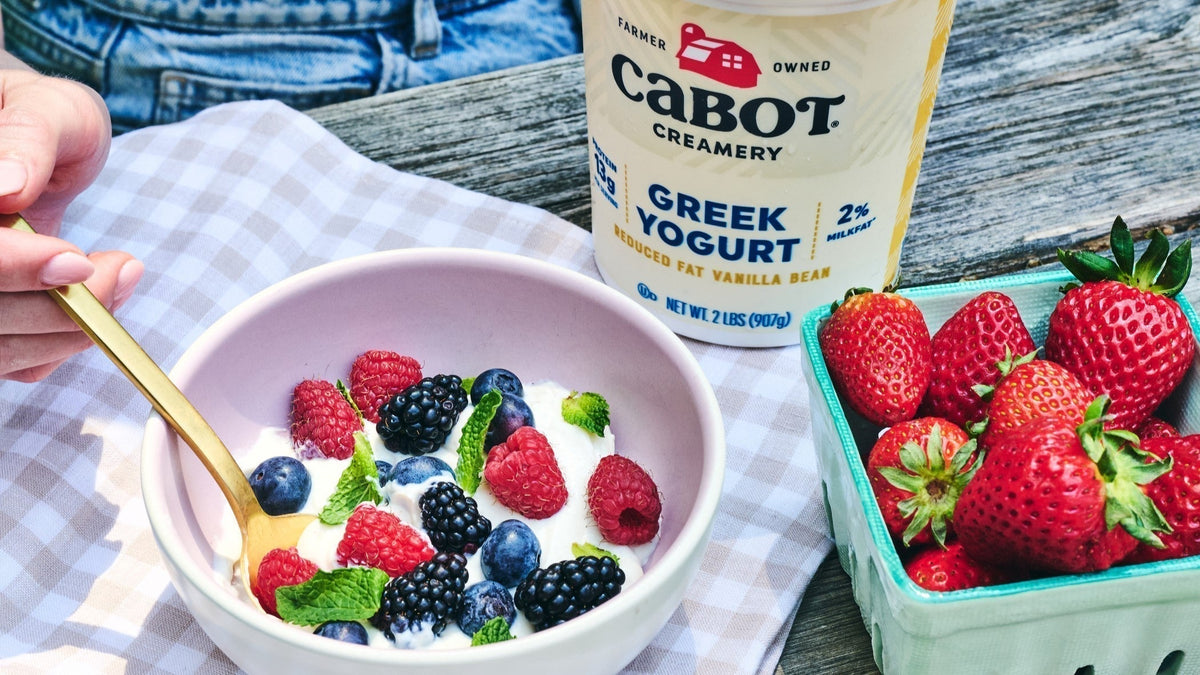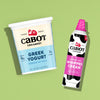
Everything You Need to Know About Yogurt
The popularity of yogurt is on full display in most grocer’s dairy case. A variety of imaginative flavors, mix-ins, and consistencies are available to appeal to even the most discerning palates and picky eaters. But why the surge in yogurt popularity? Addressing some of the most often questions swirling around yogurt may provide an answer.
What is yogurt and how is yogurt made?
Yogurt is a milk product obtained by the fermentation of milk-specific microorganisms. In simple terms, milk is first heated. Next the milk is inoculated with a lactic acid–producing culture (usually lactobacillus bulgaricus and Streptococcus thermophiles) to create a fermented product. Finally, the milk is allowed to incubate for 6-8 hours resulting in a smooth, creamy and delicious product.
Is yogurt good for you?
Topped [or bottomed] with fruit, swirled in the blender, layered in a parfait, or enjoyed alone- yogurt is a delicious treat any time of the day. One cup of yogurt counts as one serving from the dairy group, a “good for you” food with many health benefits. Most yogurt varieties are gluten-free and, while yogurt is not lactose-free, the live active cultures can help break down lactose. Therefore, many people with lactose intolerance find yogurt much easier to digest than milk, especially full-fat and strained options, like Greek and Greek-style. Yogurt is also a prime source for probiotics in the diet. The "good" live bacteria improve gut health, enhance digestion and nutrient absorption, and boost immunity. Check out this delicious and healthy recipe for Low Carb Yogurt Parfaits.
What is Greek yogurt?
There are many varieties of yogurt including those with regional influence. Greek style has seen a surge in popularity in recent years. Greek Yogurt has countless uses as an ingredient in recipes and marinades and is a healthy treat on its own. Greek and Greek-style yogurts are strained or have ingredients (whey protein and milk protein concentrate) added to them resulting in a thick creamy consistency. This makes it a great base for creating sweet or savory dips which pair well with fruits and vegetables- two food groups lacking in the typical American diet. So, not only is Greek yogurt good for you, but it also promotes the intake of other healthy foods. Try our recipe for Greek Yogurt Tzatziki, it's a flavorful dip or topping that's full of protein. 
Calling all ranch fans, the addition of Greek Yogurt not only makes our Greek Yogurt Ranch Dressing tangier, it also makes it healthier.
How long can yogurt sit out?
Yogurt is best stored in the refrigerator up to 14 days (about 2 weeks) and is usually safe to eat for up to two hours at room temperature. Yogurt can be returned to the refrigerator for later enjoyment; however, the shelf-life is usually shortened.
Can you freeze yogurt?
Freezing yogurt may change the consistency; however, this is an option for extending shelf-life. Filling ice cube trays with yogurt and freezing creates a cool treat and works well for creating a frosty smoothie when added to the blender. This easy recipe for our Blueberry Recovery Smoothie will leave you feeling refreshed.
Or try these Strawberry Yogurt Pops with Shortbread Crumble that are sure to be a hit with both kids and adults.
Can dogs eat yogurt?
Need one more reason to reach for yogurt. According to the American Kennel Club, yogurt can be a good treat for dogs in small amounts. The calcium and protein are pooch approved. And yogurt can act as a probiotic, good for the digestive system. Just be sure to make choose plain and free of any added sweeteners. Added sugars are not healthy for dogs (or humans) and some artificial sweeteners, such as xylitol, are actually toxic for dogs.
Without question, yogurt in all its forms and flavors, is a delicious food packed with unrivaled nutrition for good health.
More Cheese Please
Sign up for more helpful articles, recipes and updates from Cabot! Plus get 15% off your first purchase.
















